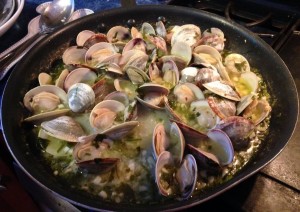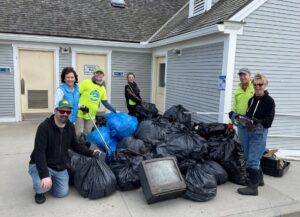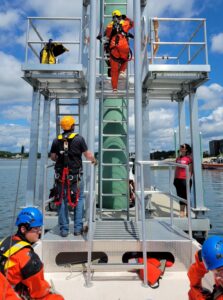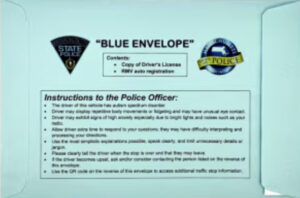Cape Cod Clams
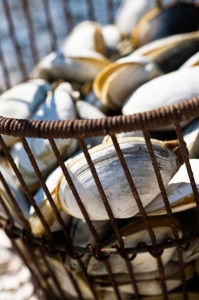
Cape Cod is home to delicious clams that are famous throughout the country. Recreational clamming adventures are a blast for the whole family and you’ll experience the satisfaction of catching your own dinner by enjoying your catch that night! There are a few things you need to know before you take on clamming – certain local requirements along with necessary equipment you’ll need. After you have everything you need, you will be on your way to eating delicious Cape Cod Clams.
Four main things you need to begin your process to catch, fresh Cape Cod Clams: a proper clam rake, a basket or bucket, a clam gauge for measuring your catch, and a shellfishing permit. To purchase clamming equipment, tackle shops will provide the essentials. There are multiple bait and tackle shops in Falmouth, Hyannis, Chatham, and the Outer Cape. Be sure to wear either rain boots, comfortable water shoes, or special clamming boots called waders or hip boots. The required permits vary town to town. So, it’s crucial that you visit your towns website or Town Hall for permit information. This information regrading regulations is for recreational clamming. You can also refer to our Cape Cod Permits page that lists necessary permits by town.
The best time to go clamming is about an hour before low tide. Access to local tide charts is available online, or pick up a copy at a marina or convenience store nearby. You will want to find out whether any areas near you are closed to shellfishing for the day or season, for schedules vary depending on water quality, weather, and population. Clams can be found in places where a small spout of water shoots up or where there is a small mound of sand with a hole in the top. You may have to dig a foot or more to find the clams. Often if you find one clam there will be many more nearby. It takes about 30 clams or roughly two hours of digging to make a pot of clam chowder. Quahogs are the larger, hard-shelled clams that are used to make chowder, stuffies, and clam cakes. Cherrystones, which are smaller, hard-shelled clams, are less chewy and are commonly used in pasta dishes. Soft-shelled clams known as steamers are often chopped and fried or steamed and served with fresh bread. Oysters are commonly eaten raw and for this reason it is especially important to know the water quality where they are harvested. Clams are measured in groups called bushels and pecks. Four pecks equal a bushel, and one peck is about 9 liters. On Cape Cod, Barnstable, Brewster, and Eastham are particularly known for good clamming. Ask locals where they have favorite spots, and keep an eye out for signs prohibiting shellfishing.
Information About Permits By Town
Bourne:
– $35 resident/taxpayer family of the towns of Bourne and Sandwich
-$10 senior resident
-$175 Massachusetts resident
Specific waterways are closed to shellfishing during the summer months, so be sure to check with the Town of Bourne website before you venture.
Permits may be purchased through the Bourne Department of Natural Resources at the Town Hall.
Mashpee:
-$25 resident/taxpayer family
-$6 senior resident/taxpayer family
-$80 non-resident family
Harvest limits – For soft-shell clams, one peck per week. For quahogs, two pecks per week. The total amount that may be taken in one week is not to exceed one bushel of any or all kinds of shellfish.
Permits may be purchased through the Town Clerk’s office in the Town Hall in Mashpee.
Falmouth:
-$25 resident/taxpayer family
-$5 senior resident
-$80 non-resident
Harvest limits – For soft-shell clams, 10 quarts may be taken per week. For quahogs, 10 quarts may be taken per day but not more than 20 quarts in any one week. The total amount that may be taken in one week is not to exceed one bushel of any or all kinds of shellfish.
Shellfish permits for Falmouth are sold at the Tax Collector’s Window in Falmouth Town Hall.
Barnstable:
-$30 resident family
-$20 senior resident family
-$120 non-resident family
-$60 seasonal family
Harvest limits – For soft-shell clams, one level peck per week. For quahogs, one level peck per week. The total amount that may be taken in one week is not to exceed one bushel of any or all kinds of shellfish.
Shellfishing may only take place Wednesdays, Saturdays, and Sundays.
Permits may be purchased at the Marine and Environmental Affairs Office at 1189 Phinney’s Lane in Centerville, or by mail with proof of residency and payment included.
Yarmouth:
-$30 resident/taxpayer
-$15 senior resident/taxpayer
-$80 non-resident
Harvest limits – For soft-shell clams, one level 10-quart wire basket per week. For quahogs, one level 10-quart wire basket per week. The total amount that may be taken in one week is not to exceed one bushel of any or all kinds of shellfish. Additionally, clamming is only allowed on Sundays in Yarmouth.
Permits may be purchased at the Yarmouth Town Clerk’s Office at 1146 Rt 28 in South Yarmouth.
Dennis:
-$20 resident/property owner household
-$3 senior resident household
-$65 non-resident
Harvest limits – For soft-shell clams, a maximum of 10 quarts per week. For quahogs, a maximum of 10 quarts per week. Each permit is allowed only one limit per week.
Shellfishing is permitted seven days a week from sunrise to sunset.
Permits may be purchased at the Town Hall at 485 Main Street, South Dennis.
Harwich:
-$20 resident/taxpayer family
-$6 senior resident/taxpayer
-$60 non-resident family
-$20 non-resident 1-day
Harvest limits – One 10-quart pail of shellfish per week (combined total of all types of shellfish harvested).
During summer months, the open days to shellfish are Wednesdays, Saturdays, and Sundays.
Shellfishing licenses are available to purchase at the Office of the Harbormaster at Saquatucket Harbor on Route 28 in Harwich Port.
Brewster:
-$25 resident/taxpayer
-$5 senior resident/taxpayer
-$20 weekly non-resident
-$125 annual non-resident
Harvest limits – For soft-shell Clams, 5 quarts per week. For quahogs, 10 quarts per week, including shells. Not to exceed 10 quarts total per week.
Permits can be obtained at the Town Hall in Brewster at 2198 Main St (Route 6A).
Chatham:
-$25 resident/taxpayer family
-$10 senior resident/taxpayer family
-$80 non-resident family
Harvest limit – One 12-quart pail of soft-shell clams, or one 12-quart pail of quahogs. The total amount that may be taken in one week is not to exceed one bushel of any or all kinds of shellfish.
Purchase a shellfishing permit at the Sticker Office at 261 George Ryder Road in Chatham.
Orleans:
-$20 resident family
-$10 senior residents
-$70 Massachusetts residents
-$70 non-residents
Harvest limit – A total of one 10-quart pail of any and all kinds of shellfish per week, except for mussels, the taking of which shall not exceed one-half (1/2) bushel per week.
Get your permit in person or by mail from the Town Clerk at Orleans Town Hall, 19 School Road in Orleans.
Eastham:
-$25 resident/taxpayer
-$12 senior resident
-$65 renter
-$75 non-resident
-$20 7-day
Harvest limit – A total of one 10-quart pail per week of any and all kinds of shellfish.
Obtain a permit at the Natural Resources Office at 555 Old Orchard Road in Eastham.
Wellfleet:
Seasonal (June 1-Sept 30):
-$30 resident/taxpayer
-$75 non-resident
Annual (January 1-December 31):
-$50 resident/taxpayer
-$10 senior resident/taxpayer
-$200 non-resident
Harvest limits – The total amount of soft-shell clams and quahogs taken in one week shall not exceed 10 quarts.
Purchase a shellfish permit at the Town Hall at 300 Main Street in Wellfleet.
Truro:
-$10 resident/taxpayer
-$50 non-resident
-FREE senior residents
Harvest limits – For soft-shell clams, one 10-quart bucket per day. For quahogs, one 10-quart bucket per day. If both clams and quahogs are taken, the limit is one 10-quart bucket per day. The total amount that may be taken in one week is not to exceed one bushel of any or all kinds of shellfish.
Buy a permit at the Truro Town Hall, 24 Town Hall Road, Truro.
Provincetown:
-$15 resident/taxpayer
-$50 non-resident
-FREE resident senior
Harvest limit – The weekly limit for any combination of quahogs, soft-shelled clams, and oysters is either one level 10-quart pail, or a peck shellfish basket. No other containers are allowed on the tidal flats. The sea clam limit is one bushel per week.
Purchase a permit at the Town Hall on 260 Commercial St. in Provincetown.
What’s Next?
After you gather your clams, you should eat them within 24-48 hours after catch! It’s best to store them in a cool place, such as a refrigerator. Do not store them with water and do not freeze them! If a clam shells cracks, you should discard the clam. Here is an example of clams being steamed open and then will be served over pasta.
